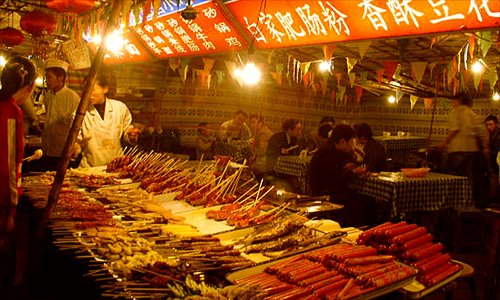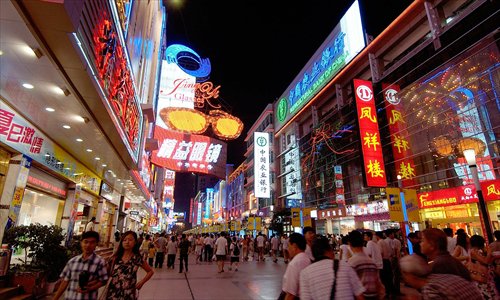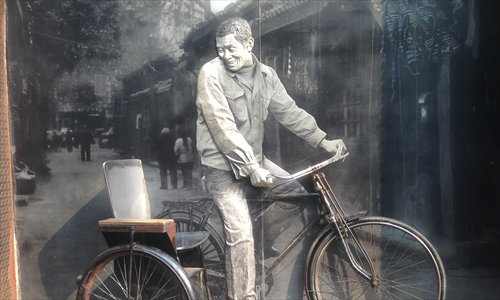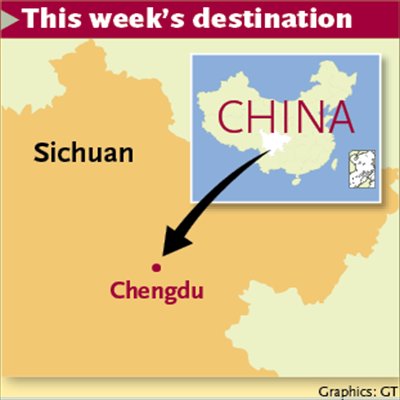Chengdu impression
A city caught between its past and its future

The Chengdu night market Photo: CFP

Street scene in Chengdu Photo: CFP

A sculpture on Narrow and Wide street Photo: Catherine Wang

This week's destination
Before going to Chengdu, I had been told to expect three things from the city: Spicy food, beautiful women, and a laid-back attitude to life.
As soon as I got out of the train and into a taxi that took me to the center of the city, I was besieged by the smell of local delicacies, not unlike the overwhelming aromas that one is immediately hit by when frequenting "Ghost Street" in Beijing, but even stronger. It was a promising omen of things to come.
A local friend, Mao Yiting, invited me to a hot pot lunch with her family.
"You should try the beef tallow soup," Mao's uncle-in-law, a man I addressed as Mr Dang, told me. Now in his 50s, Mr Dang his wife Mrs Dang have lived within Chengdu's first ring road for most of their lives. Like most Chinese people born in the 1950s, they greatly admired the People's Republic of China's first generation of leaders. When they learnt that I had come from Beijing, they were full of recollections and questions.
"The first time we visited Beijing was when we were 14 years old during the Cultural Revolution (1966-76). We were Red Guards, and we saw Chairman Mao pass us in a parade car," Mr Dang recalled. "We were an unfortunate generation. Our studies were interrupted by revolution, and we were laid off at the time that it was possible to earn a lot of money again."
Mr Dang was referring to the reforms of State-owned enterprises in the 1990s. The factory where Dang worked, the Red Flag Machine Tool Plant, is now an "Electronics Town."
Mrs Dang is now retired, and spends between three and five hours each day playing mahjong.
In Chengdu, mahjong is symbolic of the unhurried, carefree way of life here. Wandering through the streets, I spotted teahouses filled with mahjong tables. For 50 yuan ($8.13) total, four players can occupy a table for five or six hours.
Dancing the day away
Chengdu's popular People's Park throngs with dancers much like the public parks in Beijing, with one notable difference. Here, there are just as many young men participating in the communal dances there are middle aged aunts.
Strapping young men lead the dances, and there is no shortage of other young men watching form the sidelines.
"Chengdu people are so open-minded now," said a 46-year-old man surnamed Liu who was in the park when I visited. "It was impossible to even imagine people dancing in public when I was younger. When I was courting my wife, we didn't even dare to hold hands. These days, young lovers have no qualms about kissing in front of strangers."
Just opposite where the dancing took place was a matchmaker's market. On one of the main roads, pieces of paper were tied to trees with profiles of single men and women in the city.
A typical note read: "Female, born in 1981, 1.58m, college degree, sales, good looking, gentle, traditional, only child, both parents retired with pensions. Looking for a man born between 1976 and 1982, college degree or above, with a house and stable job. Never married."
An old lady who was reading the notice shook her head in a disappointment.
"What a shame! My son was born in 1974. Otherwise they could have gone on a date," she muttered.
One of the matchmakers, a woman surnamed Hu, told me that most of the notices are put up by parents who are anxious to find a match for their children.
For a man to be considered a desirable marriage prospect, he needs to have a house, a job and good family background, Hu told me. For women, the key criteria were looks, figure and age. Girls who say they are "traditional" also gain bonus points.
"Women's status in society has changed," Mrs Dang told me during a later visit.
Whereas traditionally, sons were always preferred over daughters, these days, said Mrs Dang, some parents in cities preferred to have a girl. A son would saddle parents with a large economic burden when it came time to marry, due to the obligation to provide a house, whereas a daughter meant less financial pressure when their child reached a marriageable age. "Having a daughter, I have more time to relax and enjoy life," said Dang. "Raising a son is like having a vampire."
Chengdu people are proud of their city. "If you want to have a view of old Chengdu, go to Narrow and Wide Street," Mao suggested. But I was disappointed by how this community had been redeveloped since 2003: Roads and houses were brand new, and the souvenirs on offer were like the ones that could be found in any other city.
Does tourism save or destroy an old community? Revitalization takes the same form everywhere, with things ending up looking exactly the same. When I visited Chengdu's "old" district, it was just like Beijing's Nanluoguxiang or Qianmen Street. The only differences were the occasional old pot or a black and white television, deliberately placed to hark back to Chengdu's old days.
"At least the vendors here are orderly and the people are polite," Mao told me. "You don't know how crazy tourism can be until you go to Mount Emei."
I learned the hard way.
As soon as I arrived at the foot of the mountain, after a 160-kilometer taxi ride from Chengdu, a mob of women from various hostels in the area immediately swarmed us before we could even step out of the cab.
Monkey business
The monkeys in Mount Emei were annoying, but even more irritating were the peddlers of monkey food. A woman holding bags of sweet corn warned me, "If you don't buy, you won't be able to go through the road. The monkeys will snatch your belongings."
This turned out to be true. Worse yet, even as tourists were being harassed by the monkeys, the peddlers just stood to the side, still trying to sell their wares while egging the monkeys on.
At a narrow pass, a 92-year-old man sat perched on a rock, selling bamboo sticks that would allow tourists to shoo the monkeys away.
He had lived in the mountains his whole life, planting bamboo. He sold the sticks for 1 yuan each, and it was his only income. His only son died in an accident four years ago while working on a tourism project on the mountains. He was compensated with 40,000 yuan.
In contrast to this lonely old man were the noisy crowds of tourists and restaurants springing up everywhere. Space for business on the mountain is limited. Competition is fierce.
Back in the city, the owner of a noodle restaurant told me how proud she was that Chengdu had developed so rapidly these last few years.
"In the future, it will be even better," she declared confidently.
She pointed to the building in the opposite street."The walls were newly painted for the big meetings last year," she said, referring to the 12th Fortune Global Forum in June and and the World Chinese Entrepreneurs' Convention in September last year.
"They painted every building?" I asked. "Of course not," she laughed. "Just those you can see in the street when you pass by."
"But are you earning more than before the meeting?" I asked.
"No, there's not much difference," she said.
Rules of thumb
How to get there: The best way of getting from Beijing to Chengdu is by plane, which takes 2 hours and 50 minutes. The fastest train is the T57, which takes 22 hours from Beijing West Railway station. Prices are 254.5 yuan for a hard seat, 464.5 for a hard sleeper, and 717.5 for a soft sleeper.
Where to stay: There an abundance for accommodation in Chengdu. If you want to make friends on the trip, the International Youth Hostels are recommended. If you want to stay in the center of the city, Dragon Town Guest House is a good option, with clean rooms, a comfortable atmosphere and nice owner.
What to wear: The average temperature of Chengdu over the year is 16.2 degrees Celsius. But remember to bring enough clothes if you plan on climbing the mountains.
Notes: Pay attention to the time and location of various buses that take passengers to the popular tourist sites around Chengdu city.
As for food, Chengdu is the home of hot pot, so make sure to give it a try. The broths are more unique and authentic than anywhere else in China.